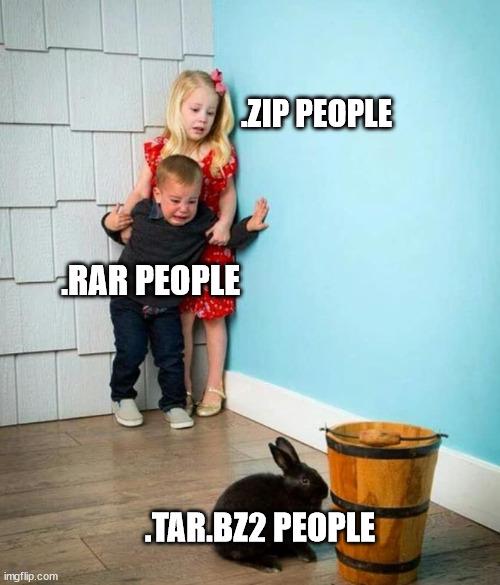this post was submitted on 06 Jun 2024
933 points (99.1% liked)
linuxmemes
23259 readers
908 users here now
Hint: :q!
Sister communities:
Community rules (click to expand)
1. Follow the site-wide rules
- Instance-wide TOS: https://legal.lemmy.world/tos/
- Lemmy code of conduct: https://join-lemmy.org/docs/code_of_conduct.html
2. Be civil
- Understand the difference between a joke and an insult.
- Do not harrass or attack users for any reason. This includes using blanket terms, like "every user of thing".
- Don't get baited into back-and-forth insults. We are not animals.
- Leave remarks of "peasantry" to the PCMR community. If you dislike an OS/service/application, attack the thing you dislike, not the individuals who use it. Some people may not have a choice.
- Bigotry will not be tolerated.
3. Post Linux-related content
- Including Unix and BSD.
- Non-Linux content is acceptable as long as it makes a reference to Linux. For example, the poorly made mockery of
sudoin Windows. - No porn. Even if you watch it on a Linux machine.
4. No recent reposts
- Everybody uses Arch btw, can't quit Vim, <loves/tolerates/hates> systemd, and wants to interject for a moment. You can stop now.
5. 🇬🇧 Language/язык/Sprache
- This is primarily an English-speaking community. 🇬🇧🇦🇺🇺🇸
- Comments written in other languages are allowed.
- The substance of a post should be comprehensible for people who only speak English.
- Titles and post bodies written in other languages will be allowed, but only as long as the above rule is observed.
6. (NEW!) Regarding public figures
We all have our opinions, and certain public figures can be divisive. Keep in mind that this is a community for memes and light-hearted fun, not for airing grievances or leveling accusations. - Keep discussions polite and free of disparagement.
- We are never in possession of all of the facts. Defamatory comments will not be tolerated.
- Discussions that get too heated will be locked and offending comments removed.
Please report posts and comments that break these rules!
Important: never execute code or follow advice that you don't understand or can't verify, especially here. The word of the day is credibility. This is a meme community -- even the most helpful comments might just be shitposts that can damage your system. Be aware, be smart, don't remove France.
founded 2 years ago
MODERATORS
you are viewing a single comment's thread
view the rest of the comments
view the rest of the comments

Zip makes different tradeoffs. Its compression is basically the same as gz, but you wouldn't know it from the file sizes.
Tar archives everything together, then compresses. The advantage is that there are more patterns available across all the files, so it can be compressed a lot more.
Zip compresses individual files, then archives. The individual files aren't going to be compressed as much because they aren't handling patterns between files. The advantages are that an error early in the file won't propagate to all the other files after it, and you can read a file in the middle without decompressing everything before it.
Yeah that's a rather important point that's conveniently left out too often. I routinely extract individual files out of large archives. Pretty easy and quick with zip, painfully slow and inefficient with (most) tarballs.
Can you evaluate the directory tree of a tar without decompressing? Not sure if gzip/bzip2 preserve that.
Nowhere in here do you cover bzip, the subject of this meme. And tar does not compress.
It's just a different layer of compression. Better than gzip generally, but the tradeoffs are exactly the same.
Well, yes. But your original comment has inaccuracies due to those 2 points.